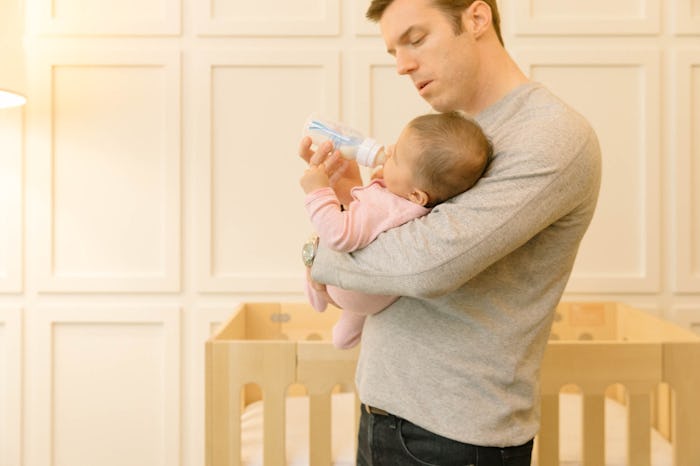Life
Actually, Bottles Aren't Bad For Your Babies' Teeth If You Follow A Few Guidelines
In the first year of life, even after beginning to eat solid foods, a baby's primary source of nutrition overwhelmingly comes from breast milk or formula. Every mom, whether breastfeeding or bottle feeding, wants to give her child those liquid nutrients that are so important for his growth and development for as long as he benefits from it. But we also hear murmurs about the supposed dangers of bottle feeding: specifically, whether the usage of bottles can detrimentally effect a child's oral health. Are bottles bad for babies' teeth, and should we be trying not to use them? Dentists say not necessarily.
Board-certified pediatric dentist Dr. Erin Issac tells Romper that the risks associated from bottle feeding are based on two factors: the age of the child and whether they are falling asleep with the bottle. According to Issac, a toddler should be completely weaned off a bottle by at least halfway through their second year of life, and putting a baby of any age to bed with a bottle is a huge parenting no-no.
"We recommend that babies stop using a bottle and begin transitioning to a sippy cup around age 1," the dentist explains. "Kids should never be put to bed at any age with a bottle of anything other than water, as it can increase their risk of cavities. Little ones who are put to bed with a bottle of milk or juice typically end up with severe early childhood caries, also known as 'baby bottle syndrome.'"
Some people assume that cavities in baby teeth are no big deal since they will eventually fall out anyway, but this is false: cavities in baby teeth can cause pain and are at risk for infection, and must be treated accordingly.
"Cavities in baby teeth need to be fixed, just like cavities in adult teeth," clarifies Dr. Issac, "But with a little one that often means having invasive procedures done under general anesthesia, as a toddler can't sit in a dental chair for long enough to safely and efficiently have several fillings placed or even extractions done."
As if that news wasn't somber enough, there's more: Prolonged bottle usage (over the age of 18 months) can cause orthodontic issues in both baby teeth and permanent ones. Issac explains, "The tongue is an extremely strong muscle, and it pushing against the nipple on the bottle can cause the moldable bones of the palate to take the shape of the bottle nipple. This causes crowding of teeth and can even change the shape of the upper jaw and palate."
While the American Academy of Pediatrics does state that "Breast milk offers medical and psychological benefits not available from human milk substitutes," some of us have really good reasons for not exclusively breastfeeding. So should the above information on risks make parents paranoid or feel guilty about using a bottle? Definitely not. Feeding your baby formula is a justifiable choice and, after all, many breastfeeding mothers still use a bottle for various occasions and the risks apply to their circumstances as well.
In our modern society, bottle feeding is, to some degree, a simple fact of life for most families — and it's a perfectly healthy practice when used within the prescribed parameters that Dr. Issac laid out. The most important thing for parents of bottle fed infants to remember is simple: Don't let them take it to bed, and don't let them use it past the age of 18 months. Other than that, relax mom and dad — baby will be just fine.
